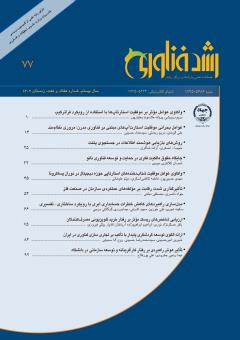جایگاه حقوق مالکیت فکری در حمایت و توسعه فنآوری نانو
محورهای موضوعی : مالکیت فکری و مدیریت سرمایههای نامشهود
1 - دانشگاه پیام نور تهران
کلید واژه: حقوق نانو تکنولوژیفناوری نانوحقوق مالکیت فکریحقوق فناوریمالکیت صنعتی,
چکیده مقاله :
مالکيت فکري حقوقي است که به صاحب آن اختيار انتفاع انحصاري از فعاليت و فکر و ابتکار انسان را مي دهد که خود به شاخه هاي گوناگون چون حقوق مالکيت ادبي و هنري و مالکيت صنعتي تقسيم مي شود. در مقايسه با ساير کالاها و محصولات، محصول هوش انساني داراي چهار خصيصه است: اول اينکه نتيجه مستقيم کار فکر انسان است؛ دوم آن که اين محصول در طبقه اطلاعات مي گنجد؛ سوم آن که اين محصول هوشمند در اثر مصرف از بين نمي رود؛ چهارم آن که به راحتي عرضه شده و قابليت تکثير دارد. ويژگي هاي مزبور باعث مي گردد که صاحب چنين محصولي نتواند استفاده از آن را تحت کنترل خود نگه داشته و به راحتي از دست مي رود. در واقع ارزش اقتصادي يک آفرينش فکري به دليل نادر بودن و کميابي آن است که در صورت عدم حمايت و دستيابي تعدادي افراد به آن و بهره برداري و استعمال آن، ارزش ياد شده از ميان رفته و يا حداقل کاهش خواهد يافت. در ايران قوانين متعددي راجع به حمايت از آثار فکري به تصويب رسيده که در مقايسه با قوانين جهاني بسيار ناقص و ابتدايي بوده و به اصلاح و تکميل نياز دارند. فناوري نانو مسائل قانوني جديدي را در زمينهحقوق و مالکيت فکري ايجاد نموده است. شايد بتوان برخي از اين مسائل را با قوانين موجود و يا با کنترل و تعديل قلمرو نانو حل و فصل نمود ولي ممکن است براي کنترل قلمرو نانو نياز به وضع قوانين جديدي داشته باشيم.
Intellectual property is a right that gives its owner the exclusive benefit of human activity, thought and initiative, which itself is divided into various branches such as literary and artistic property rights and industrial property. Compared to other goods and products, the product of human intelligence has four characteristics: 1- First, it is a direct result of the work of human thought; 2- Second, this product falls into the information category; 3- Third, this smart product is not wasted by consumption; 4- The fourth is that it is easily supplied and can be reproduced. These features make the owner of such a product can not control its use and is easily lost. In fact, the economic value of an intellectual creation is due to its rarity and scarcity that if a number of people do not support and achieve it and exploit and use it, the mentioned value will be lost or at least reduced. In the legal system of Iran, several laws have been passed regarding the protection of intellectual property, which are very incomplete and rudimentary in comparison with international laws and need to be amended and supplemented. Nanotechnology has created new legal issues in the field of rights and intellectual property. Some of these issues may be resolved by existing laws or by controlling and modifying the nanosphere, but we may need to enact new laws to control the nanosphere.
